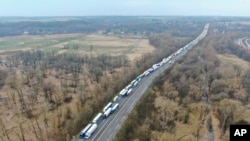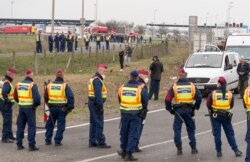Strict new controls to slow the spread of the coronavirus froze traffic at global borders Tuesday, idling trucks in columns more than 30 miles long at some European crossings, while masked security officers turned back travelers at others.
The moves by officials bent on protecting their citizens raised new questions about how to maintain supplies of food, medical equipment and other goods in coming weeks that will be critical to nations in lockdown.
Word of the border closings fanned growing fears in Europe, prompting widespread hoarding.
"There is enough for everybody," German Agriculture Minister Julia Kloeckner said, castigating people for spreading panic by posting fake reports that supermarkets would be closing. "I'm certain we will weather this society-wide situation well, so long as we behave as a society."
The moves come as caseloads in Spain and Italy — where more than 2,500 deaths now account for a third of world's total — continued to spiral. Worldwide, the number of cases topped 190,000.
In the U.S., retailers and food companies scrambled to ramp up production after two weeks of panic-purchasing by shoppers. Walmart, the nation's largest retailer, and supermarket chains like Wegman's, cut store hours to give workers time to restock shelves.
To help speed shipments, U.S. officials suspended rules Tuesday capping the road time of truckers who are hauling food or emergency medical supplies.
The shortages come despite the fact that much of the food Americans consume is produced domestically and does not need to be moved across borders. But that has done little to quell fears that have emptied stores of items ranging from garlic to paper towels.
"I don't think anyone has seen anything like this ... certainly not in this country," said Per Hong, an executive at the management consulting firm, Kearney.
In Britain, where officials had resisted stringent measures to curb the virus, new research on the virus prompted a dramatic escalation Tuesday. A study by Imperial College London estimated that the virus could kill 250,000 people in the United Kingdom and more than 1 million in the U.S., unless officials took action to stop its spread.
Prime Minister Boris Johnson told people to eliminate unnecessary contact with others, work from home where possible and avoid bars, restaurants, theaters and other venues. Schools remained opened for the time being. Some scientists, though, said the government should have taken action sooner.
The European Union also issued guidelines aimed at facilitating the flow of critical goods like food and medicine, while helping individual nations restrict non-essential travel in an effort to slow the spread of the COVID-19 virus.
But on Tuesday it was chaos on many borders, with traffic backed up for dozens of kilometers (miles).
"We are all desperate, cold and sleepless here for a third day," said Janina Stukiene, who was stuck in Lithuania on the border with Poland with her husband and son. "We just want to go home."
The line of cars and trucks in Lithuania was some 60 kilometers (37 miles) long after Poland closed its border, while similar traffic jams could be seen on the borders with Germany and the Czech Republic.
Lithuania was sending military airplanes and special trains to Germany to help hundreds of its citizens stranded at the crossing points with Poland.
To try to help citizens from Estonia and Lithuania get home following closure of the Polish border, German police organized a convoy of vehicles to a ferry port on one of its Baltic Sea islands.
Estonia, meantime, commissioned a ferry large enough for 2,500 passengers to fetch Estonians and Latvians unable to transit Poland to return home from Germany.
French President Emmanuel Macron, who had a phone call with German Chancellor Angela Merkel and EU officials, called for "intensifying European coordination and quickly taking effective and concerted action." He condemned unilateral border control measures by some member states within the EU, according to his office.
Like Germany, France insists the free flow of goods must be guaranteed and cross-border commuting for work should be allowed.
Germany launched a 50 million euro ($56 million) effort to bring home thousands stranded in popular winter vacation spots across the globe, including up to 5,000 in Morocco alone.
"Even if we will do everything humanly possible, we cannot in every case provide a solution within 24 hours," Foreign Minister Heiko Maas warned.
More than 100,000 Germans are thought to be in various places around the world looking to get home, including some 30,000 in Egypt, primarily on holiday.
Airlines have slashed flights due to a plunge in demand but also because many countries have been barring foreign arrivals.
Turkey planned to evacuate 3,614 citizens stranded in nine European countries after flights were suspended, Foreign Minister Mevlut Cavusoglu said.
Regional authorities in Spain's Balearic Islands effectively locked down the Mediterranean archipelago by restricting all but a handful of daily flights and incoming boats for returning island residents.
Spain, now the fourth-most infected country, saw the number of people with the virus rise by more than 2,000 in one day to 11,178 and virus-related deaths jump by almost 200 to 491. Only China, Italy and Iran had more infections.
The virus causes only mild or moderate symptoms, such as fever and cough, for most people, but severe illness is more likely in the elderly and people with existing health problems. COVID-19 has killed over 7,500 people so far, while more than 80,000 have recovered.
In Italy, reported infections jumped to 27,980. With 2,503 deaths, Italy now accounts for nearly a third of the global death toll.
Iran state TV warned that "millions" could die in the Islamic Republic alone if the public keeps traveling and ignores health guidance. World Health Organization officials have said the number of cases there — nearly 15,000 with 853 deaths — have been sharply under-reported.
Some bright spots emerged. Wuhan, the central Chinese city where the virus was first detected late last year and which has been under lockdown for weeks, reported just one new case Tuesday.
Shares reversed early losses in Asia on Tuesday and stocks pushed higher on Wall Street, a day after their worst plunge in more than three decades as more aid appeared on the way from Washington. The 4.3% rise for the S&P 500 followed Monday's nearly 13% plummet.
Still, markets around the world remained highly volatile as traders see a recession growing more likely.
A senior South Korean health official, Kwon Jun-wook, urged people to take the virus seriously.
"In a similar wayto how the Sept. 11 attacks completely changed people's perception about security, quarantine authorities like us believe the daily lives of all the people around the world will be changed because of COVID-19," Kwon said.
Malaysia banned foreign travel and was allowing only essential services to stay open.
The eastern Caribbean island of Barbados confirmed its first two cases, saying both were linked to people who had recently traveled there from the U.S.
Jack Ma, founder of the Chinese tech giant Alibaba, said his foundation would donate more than 1 million testing kits — 20,000 testing kits to each of Africa's 54 countries —as the coronavirus starts to spread on the extremely vulnerable continent.
Thirty African countries have confirmed cases but about a dozen lack testing capability.
"We cannot ... assume this continent of 1.3 billion people will blissfully escape the crisis," Ma said.
Bloomberg Philanthropies also announced a $40 million initiative to help vulnerable countries, notably in Africa.
As the pandemic expanded in Europe, the Mideast and the Americas, China and South Korea were trying to hold their hard-fought gains. China was quarantining new arrivals and South Korea was to increase screenings of all overseas arrivals.
Infections have continued to slow in South Korea's worst-hit city of Daegu. But there's concern over a steady rise of infections around Seoul, where new clusters have emerged.
In the U.S., officials urged older Americans and those with chronic health conditions to stay home, and recommended all group gatherings be capped at 10 people. School closings in 56 countries kept more than 516 million students home, the U.N. said.
The new research published in Britain suggest that countries have little choice but to act. The analysis, drawing on the latest data from China and Italy, found that "mitigation" — slowing but not stopping the spread of the virus while protecting vulnerable groups like the elderly — would still lead to a huge number of cases that would overwhelm the health care system.
Researchers estimated as many as half of all cases were not identified and that 30% of hospitalized patients would require critical care. They also suggested almost 81% of the population in the U.S. and U.K. might be infected during the pandemic and said the drastic social restrictions might need to be in place for many months.





